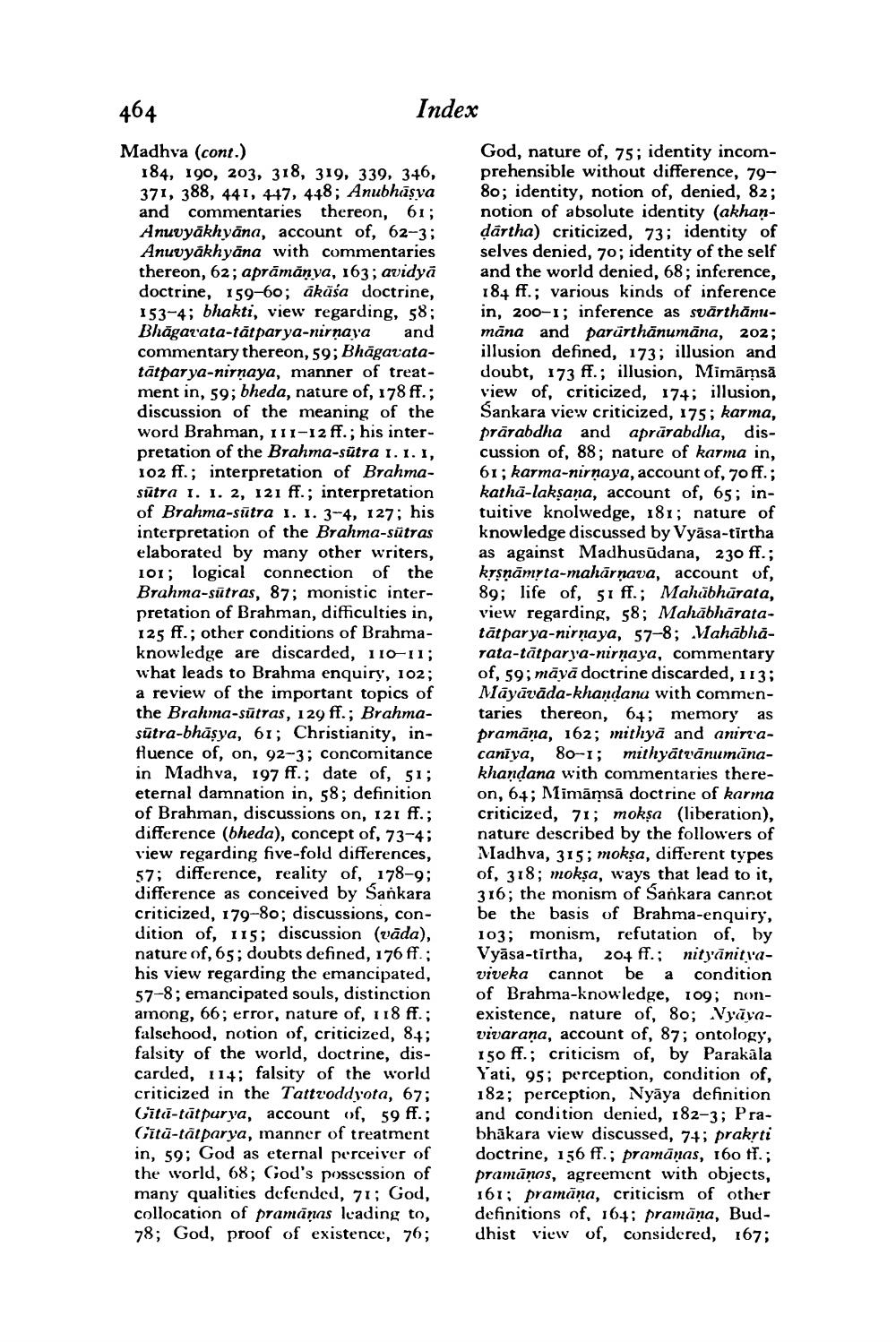________________
464
Index
Madhva (cont.)
184, 190, 203, 318, 319, 339, 346, 371, 388, 441, 447, 448; Anubhusva and commentaries thereon, 61; Anuvyākhyāna, account of, 62-3; Anuvyākhyāna with commentaries thereon, 62; aprāmānva, 163; avidyā doctrine, 159-60; ākāśa doctrine, 153-4; bhakti, view regarding, 58; Bhagavata-tātparya-nirnaya and commentary thereon, 59; Bhāgatatatātparya-nirnaya, manner of treatment in, 59; bheda, nature of, 178 ff.; discussion of the meaning of the word Brahman, 111-12 ff.; his interpretation of the Brahma-sūtra 1.1. I, 102 ff.; interpretation of Brahmasūtra 1. I. 2, 121 ff.; interpretation of Brahma-sūtra 1. 1. 3-4, 127; his interpretation of the Brahma-sütras elaborated by many other writers, 101; logical connection of the Brahma-sūtras, 87; monistic interpretation of Brahman, difficulties in, 125 ff.; other conditions of Brahmaknowledge are discarded, 110-11; what leads to Brahma enquiry, 102; a review of the important topics of the Brahma-sūtras, 129 ff.; Brahmasütra-bhāsya, 61; Christianity, influence of, on, 92-3; concomitance in Madhva, 197 ff.; date of, 51; eternal damnation in, 58; definition of Brahman, discussions on, 121 ff.; difference (bheda), concept of, 73-4; view regarding five-fold differences, 57; difference, reality of, 178-9; difference as conceived by Sankara criticized, 179-80; discussions, condition of, 115; discussion (vāda), nature of,65; doubts defined, 176 ff.; his view regarding the emancipated, 57-8; emancipated souls, distinction among, 66; error, nature of, 118 ff.; falsehood, notion of, criticized, 84; falsity of the world, doctrine, discarded, 114; falsity of the world criticized in the Tattrodd yota, 67; Gītui-tātpurya, account of, 59 ff.; Gītā-tātparya, manner of treatment in, 59; God as eternal perceiver of the world, 68; God's possession of many qualities defended, 71; God, collocation of pramāņas leading to, 78; God, proof of existence, 76;
God, nature of, 75; identity incomprehensible without difference, 7980; identity, notion of, denied, 82; notion of absolute identity (akhandārtha) criticized, 73; identity of selves denied, 70; identity of the self and the world denied, 68; inference, 184 ff.; various kinds of inference in, 200-1; inference as svārthānumāna and parürthānumāna, 202; illusion defined, 173; illusion and doubt, 173 ff.; illusion, Mimämsä view of, criticized, 174; illusion, Sankara view criticized, 175; karma, prārabdha and aprūrabdha, discussion of, 88; nature of karma in, 61; karma-nirnaya, account of, 70 ff.; kathā-laksana, account of, 65; intuitive knolwedge, 181; nature of knowledge discussed by Vyāsa-tirtha as against Madhusūdana, 230 ff.; kysnāmyta-mahārņava, account of, 89; life of, 51 ff.; Mahābhārata, view regarding, 58; Mahābhāratatātparya-nirnaya, 57-8; Mahābhărata-tātparya-nirnaya, commentary of, 59; māyā doctrine discarded, 113; Māyāvāda-khandana with commentaries thereon, 64; memory as pramāna, 162; mithyā and anirtacaniya, 801; mithyātrānumūnakhandana with commentaries thereon, 64; Mimāṁsā doctrine of karma criticized, 71; mokşa (liberation), nature described by the followers of Madhva, 315; moksa, different types of, 318; mokşa, ways that lead to it, 316; the monism of Sankara canrot be the basis of Brahma-enquiry, 103; monism, refutation of, by Vyāsa-tirtha, 204 ff.; nityānitvaviveka cannot be a condition of Brahma-knowledge, 109; nonexistence, nature of, 80; Vyavavivarana, account of, 87; ontology, 150 ff.; criticism of, by Parakāla Yati, 95; perception, condition of, 182; perception, Nyāya definition and condition denied, 182–3; Prabhākara view discussed, 74; prakrti doctrine, 156 ff.; pramānas, 160 tl.; pramūnos, agreement with objects, 161; pramāna, criticism of other definitions of, 164; pramāna, Buddhist view of, considered, 167;




